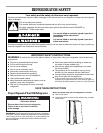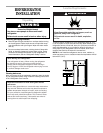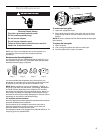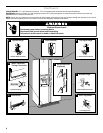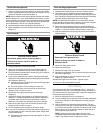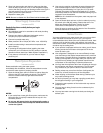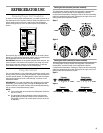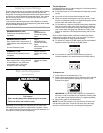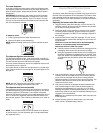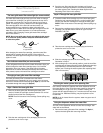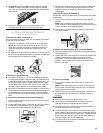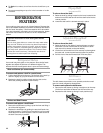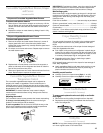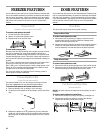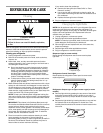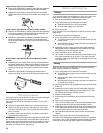
11
The water dispenser
If you did not flush the water system when the refrigerator was
first installed, please do so before using the water dispenser. To
flush the water system, please see the section “Water System
Preparation.”
IMPORTANT:
Depending on your model, the small removable
tray at the bottom of the dispenser is designed to catch small
spills and allow for easy cleaning. There is no drain in the tray.
The tray can be removed from the dispenser and carried to the
sink to be emptied or cleaned.
To dispense water:
1.
Press a glass against the water dispenser lever.
2.
Remove the glass to stop dispensing.
NOTE:
Dispense enough water every week to maintain a fresh
supply.
The dispenser light (on some models)
The dispenser area has a light. It can be turned on manually by
pressing the ON button at the right hand side of the control panel.
The red indicator above the ON button will appear.
On some models: Whenever you use the dispenser the lever will
automatically turn the light on.
On models without crushed ice, the light switch is a rocker-style
type. Push the switch to turn the light on, and push again to turn
the light off.
NOTE:
See the “Changing the Light Bulbs” section for
information on changing the dispenser light bulb.
The dispenser lock
(on some models)
Your dispenser can be turned off for easy cleaning or to prevent
accidental dispensing by small children and pets. To turn off the
dispenser, press the LOCK button. The indicator will appear
above the LOCK button and the ice and water dispensers will not
work. To unlock the dispenser, press the UNLOCK button until
the indicator appears. Then continue to dispense ice or water as
usual.
NOTE:
The lock feature does not shut off power to the product,
to the ice maker, or to the dispenser light. It simply deactivates
the dispenser levers.
Interior Water Filtration System
(on some models)
The interior water filter cartridge is located in the upper corner of
the fresh food compartment of the refrigerator. The interior water
filter cartridge should be replaced every six months or earlier if
the flow of water to your water dispenser or ice maker decreases
noticeably.
Replacing the interior water filter cartridge
1.
Twist the interior water filter cartridge ¹⁄₄ turn to the left. The
INSTALL mark will be lined up with the indicator line located
on the filter mounting bracket cover.
2.
Gently pull down on the cartridge to remove it from the filter
mounting bracket assembly. To prevent water from spilling
inside the refrigerator, DO NOT TIP the cartridge. Dispose of
the cartridge.
3.
Install the new interior water filter cartridge. You can run the
dispenser without a water filter cartridge, but your water will
not be filtered.
NOTE: Do not use with water that is microbiologically
unsafe or of unknown quality without adequate
disinfection before or after the system.
■ Carefully remove the interior water filter cartridge from its
packaging. Remove the red cap from the cartridge.
■ Apply the appropriate month sticker to the cartridge as a
reminder to replace the cartridge within six months. Then
apply the “Water Filter Replacement Reminder” sticker to
your calendar as a reminder to replace the cartridge in six
months.
4.
Line up the INSTALL mark on the water filter label with the
indicator line that is molded into the filter mounting bracket
cover. Push the cartridge into the filter mounting bracket.
Twist the cartridge ¹⁄₄ turn to the right to lock it into place. The
REMOVE mark should be lined up with the indicator line
located on the front cover.
5.
Use a sturdy container to depress the water dispenser bar
until the water begins to flow. Flush the water system by
dispensing and discarding 2 to 3 gal. (8 to 12 L) of water.
Cleaning the system will take approximately 6 to 7 minutes
and will help clear air from the line. Additional flushing may be
required in some households.
NOTE:
As air is cleared from the system, water may spurt out
of the dispenser.
6.
Inspect the filter system for water leaks. If you see water
leaks, see the “Troubleshooting” section.



